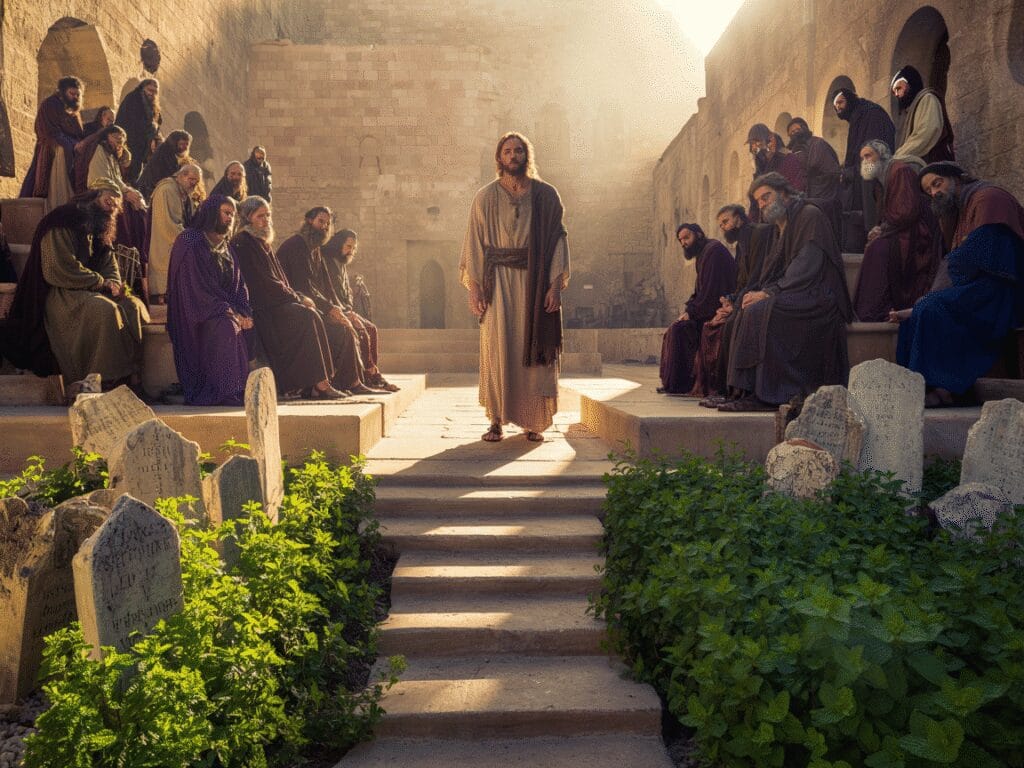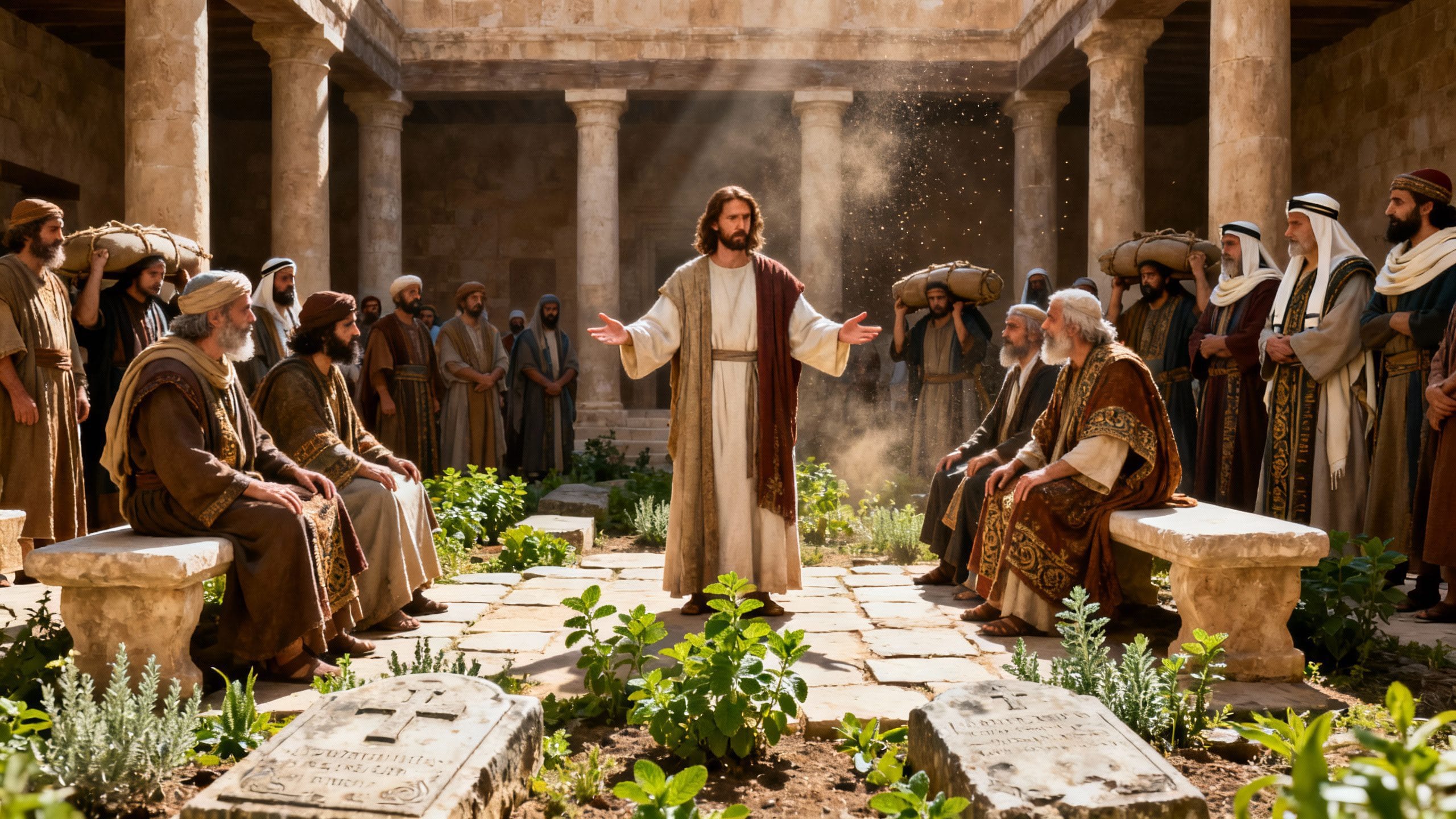Gospel of Jesus Christ according to Saint Luke
At that time, Jesus said:
“Woe to you, Pharisees,
because you pay tithe
on all the plants in the garden,
like mint and rue
and you miss out on God's judgment and love.
This had to be observed,
without giving up on that.
Woe to you, Pharisees,
because you love the chief seat in the synagogues,
and greetings in public squares.
What a misfortune for you,
because you are like those tombs that we do not see
and on which we walk without knowing it.
Then a doctor of the Law answered him and said:
“Master, speaking thus,
It's us too that you insult."
Jesus replied:
“You too, doctors of the Law, unhappy are you,
because you charge people
of burdens impossible to bear,
and you yourselves do not even touch these burdens
with one finger.
– Let us acclaim the Word of God.
Beyond Legalism to Love: Hearing and Following the Voice of Christ
From the Criticism of the Pharisees to the Freedom of the Disciples: Discern, Act, and Bear Fruit Today.
This text is addressed to those who seek a faith that is both dense and simple: demanding for the heart, light for the conscience, and fruitful for life. Starting from the "woes" addressed to the Pharisees (Lk 11:42-46) and the luminous call "My sheep listen to my voice" (Jn 10:27), we will follow a thread of transformation: moving from the weight of demands to the grace of relationships, from religious prestige to concrete charity, from the anxiety of doing good to the joy of loving better. The objective: a reproducible method for discerning, acting, and transmitting.
Place Lk 11:42-46 and Jn 10:27 in their context and spiritual scope.
Identify the guiding idea: the integration of judgment and love as the heart of the Law.
Deploy three axes: criteria, conversion of motivations, co-carrying of burdens.
Translate into practices: spheres of life, concrete projects, actionable practical sheet.
Anchor in tradition, respond to challenges, call for a joyful start.
Context
The passage from Luke 11:42-46 is at the heart of a controversy between Jesus and certain Pharisees and doctors of the Law. The reproach is not directed at observance as such, but at its imbalance: scrupulous about tithing on mint and rue, negligent about "the judgment and love of God." This tension reveals a subtle shift: when practice, even meticulous, becomes detached from its purpose, it becomes a useless burden and a screen against mercy.
The mention of the "front seats" and the "greetings in the squares" introduces the social dimension of religion: recognition becomes symbolic currency. However, spiritual life, as soon as it feeds on social gaze rather than on the gaze of God, exposes itself to a double corruption: vanity on the one hand, cynicism on the other. Jesus does not castigate to humiliate, but to liberate: he removes the mask in order to restore the face to its light.
A shocking image structures the denunciation: "tombs that cannot be seen." In Second Temple Judaism, contact with a tomb makes one impure. A hidden tomb contaminates without the knowledge of the one who walks by. It is the illustration of a religiosity that, lacking inner transparency, becomes a source of social impurity: it transmits fear and obsession instead of transmitting life.
The dialogue with a doctor of the Law shifts the critique from the ritual scene to the ethical field: "You load people with burdens impossible to bear, and you yourselves cannot touch them with a single finger." Normative hardening, without support, produces exhaustion and crushing. Jesus proposes another logic: not to abolish the Law, but to fulfill it by orienting it toward its end, the love of God and neighbor, justice as a style of relationship. Hence the convergence with Jn 10:27: "My sheep listen to my voice; I know them, and they follow me." The authority that comes from Christ is relational, not oppressive; it knows, speaks, guides, and leads to life.
Pharisees and Doctors of the Law
The Pharisees formed a revival movement that valued holiness in daily life, beyond the Temple. The doctors of the Law (scribes) were recognized interpreters of the oral and written Torah. Jesus dialogued with them from within a plural Jewish world, criticizing deviations, not a people or a tradition as a whole. His polemic was a surgical intervention, not a blanket condemnation.
Nuancing the context avoids anachronism and any anti-Judaism.

Analysis
Guiding idea: Jesus contrasts obsession with details with forgetting the essential, but without contrasting the essential with the details. The hermeneutic key lies in his balancing phrase: "This should have been observed, without abandoning that." This is not a moral deconstruction, but a hierarchy of goods: love and justice are the measure of all observance. When a seemingly minor precept (tithe of mint) takes the place of the heart (right judgment and charity), the compass goes haywire.
The rhetoric of "woes" is prophetic. It unmasks a facade of logic: first place, greetings, invisible tombs. Religion becomes a theater where one's worth is played out. In response, John 10:27 offers the counter-figure: the relationship between the shepherd and the sheep. One does not go on stage; one walks behind a voice. It is not a question of being seen, but of learning to listen.
Evidence internal to the text: the opposition "tithe... judgment and love," the images of hidden impurity, the criticism of burdens, trace a geography of deviation. External evidence (tradition): the Law aims at charity; pastoral authority is a service; discernment takes precedence over performance. Consequence: authentic spiritual reform does not abolish rites or rules, but it reorients and lightens them by reinserting them into the relationship that saves. The voice of Christ is less an order than a vital orientation: it attracts, it recognizes, it precedes.
“This… without abandoning that”
Two symmetrical errors: 1) Exhausting legalisms, without love. 2) Vague feelings, without form or fidelity. Jesus unites substance (charity) and form (practices), ordering the second to the first. Mature faith is recognized by this living balance.
bring together the essential and the secondary, but in the right order.

Judgment and Love: The Criteria of the Heart
The pair "judgment and love of God" (Lk 11:42) encapsulates biblical ethics: judging righteously and loving faithfully. Judgment here refers to relational and social discernment: knowing how to weigh equity and mercy, giving to each person what is due, and overcoming the blind spots of our preferences. God's love is not a diffuse emotion; it permeates all concrete choices, especially where they are costly. One without the other is altered: judgment without love becomes coldness; love without judgment dissolves into sentimentality.
A practical criterion emerges: that which increases the capacity for true relationship is part of love; that which diminishes it is a false zeal. Applied to observances, this means: a practice is right if it carves out in me the space for a more ardent charity and a more refined justice. Conversely, if it makes me harder, more superior, more anxious, it moves away from its purpose. This sober verification requires honesty and support.
The image of "invisible tombs" recalls another criterion: transparency. Holiness is not a white layer on a tomb; it is life at work in the mud of reality. A community that knows how to name its limits purifies itself deeply. A community that conceals them allows a silent contamination to well up: fear, shame, double talk. "Misfortunes" then take on the value of a salutary alarm.
Finally, John 10:27 proposes the ultimate regulation: listening to the voice of Christ. How? Through the Scriptures received in the Church, through silent prayer, through the test of concrete charity, through the advice of the poor and the little ones who re-teach us the center. Discernment becomes an art: does a practice, a word, a rule make me more capable of loving God and my neighbor in a just way? If so, we continue, sometimes simplifying. If not, we readjust, sometimes giving up the accessory.
Purified Motives: From Prestige to Presence
"You love the best seat and greetings": the temptation of prestige is not unique to the Pharisees. It affects every committed and virtuous environment. Where there is excellence, recognition, and symbolic capital, there is comparison, fear of falling, and calculation of reputation. Jesus does not abolish the honor due; he delivers us from the idolatry of the gaze. The antidote is not incivility, but humble presence: seeing and serving without seeing oneself as serving.
A path to purification involves the right intention: before a religious or charitable act, ask yourself internally: for whom am I doing this? For Christ and his little ones, or to maintain an image of myself? This question does not humiliate; it unifies. It converts performance into offering, protocol into presence. Gradually, identity shifts: no longer "being the one who..." but "being known by Christ." The phrase "I know them" in John 10 is tender and decisive: true security is not in being seen, but in being recognized by the One who knows.
In communities, the conversion of motivations requires concrete forms: rotation of responsibilities, shared gratitude, joint rereading of decisions based on the most vulnerable. The "first place" becomes a unit of service that circulates. Speech shifts from "I" to "we." Attention shifts to the peripheries: who does not have a seat, who is not greeted? Then the liturgy of honors is transfigured into a liturgy of charity.
Remain attentive to a paradox: visibility can be justifiable when it serves a greater good. Public witnessing, speaking out, and receiving a mission are not inherently suspect. What matters is the source (the call received), the purpose (edification of others), and the manner (joyful humility). The sign of health: joy remains even if the position disappears.
Spiritual Vanity Index
Warning signs: systematically seeking thanks, being upset at being overlooked, confusing criticism with personal attacks, preferring visible tasks, accumulating titles. Antidotes: discreet service, listening to those without power, Ignatian examination, fraternal correction.
Observe without judging; convert without exhausting yourself.

Burdens to Bear Together: Evangelical Accompaniment
"You are carrying burdens that cannot be borne": injustice is not only due to the norm, but also to the way it is applied. A just rule becomes oppressive if pedagogy, progressiveness, and fraternal help are removed. Jesus proposes another style of authority: he walks in front and beside. He teaches and he carries. He corrects and he raises up. In short, he transforms the Law into a path.
Concretely, this involves an art of accompaniment. First, lighten what is incidental, clarify what is essential, recognize what is impossible. The Christian moral life is not a constant examination, but a growth. Then, join hands in action: "not touching with a single finger" is the diagnosis of an authority that delegates constraint without sharing the cost. Evangelical authority, on the contrary, exposes itself and gets involved.
In families, teams, and parishes, we need to move from a logic of prescription to a logic of companionship: work with it, show how, celebrate progress. The classic "less, more, better" confession helps: fewer instructions, more examples, better support. Burdens become bearable when they are shared and when we know why we carry them.
Finally, connect the demand with the promise. "My sheep listen to my voice": if listening is real, walking becomes possible. A community that encourages listening (silence, Word, rereading) discovers the adjustment of rules and the courage of decisions. The voice of Christ does not impose from above; it attracts from the future. This is why the Church advances not by pressure, but by persuasion nourished by hope.
Criteria for fair support
Clarity of purpose (charity), progressiveness of steps, real co-responsibility, evaluation of the effects on the most vulnerable, right to trial and error, regular prayerful rereading.
When the accompaniment is right, the weight becomes the path.
Implications and applications
- Personal Life: Practice a daily examination of intention. Note an act where love and justice met, another where one was lacking. Adjust one concrete point for the next day.
- Family life: Reduce house "rules" to the bare minimum, name the reason for each rule, allow for exceptions, and ritualize gratitude rather than punishment.
- Community/Church Life: Audit "burdens" (calendar, obligations, forms). Remove the superfluous, explain the essentials, create mutual aid pairs, open fifteen-minute "listening windows."
- Professional life: Replace an imposed instruction with a co-constructed process. Set measurable criteria linked to the meaning of work. Share the burden of thankless tasks through rotation.
- Civic Life: Support local justice initiatives that alleviate real burdens (debt, isolation, dropping out). Participate in one hour per week in a visible, concrete action.
- Digital Life: Uncover the virtual "first place." Define usage rules that encourage listening (silent time, kind comments, shared fact-checking). Ban public humiliation.
- Spiritual Life: Reinsert practices (fasting, tithing, pilgrimage) into a charitable project. Associate each practice with a person to love and an act of justice to perform.
Resonances
The Law oriented toward charity is a patristic leitmotif. Augustine summarizes: "Love and do what you want" (not "what pleases you," but "what enlightened love commands"). Thomas Aquinas specifies: the end of the new law is the grace of the Spirit that makes us capable of charity; the precepts only have meaning in relation to this end. The norm is good if it instructs, better if it accompanies, perfect if it transforms.
Jewish tradition itself nuances observance. The Talmud and the Mishnah discuss degrees of tithing obligation, revealing a concern for consistency rather than scrupulousness. Rabbi Hillel condenses the Torah into a golden rule: "What is hateful to you, do not do to your neighbor." Jesus follows this dynamic by leading to fulfillment: loving God and neighbor summarizes the Law and the Prophets.
In the New Testament, James reminds us that "pure religion" consists of caring for orphans and widows and keeping oneself unstained by the world. Paul affirms that "the perfect fulfillment of the Law is love"; he also denounces "false brothers" who impose unnecessary burdens. The Gospel according to Matthew (chapter 23) offers a developed parallel to "woes," confirming the centrality of justice, mercy, and faithfulness.
The contemporary Magisterium continues: Vatican II (Dei Verbum) insists on listening to the Word; Gaudium et Spes reinserts faith into the joys and hopes of the world. Recent texts denounce "spiritual worldliness," this mixture of pious codes and ego, more dangerous than visible weaknesses. The ecclesiology of communion redefines authority as service, demand as a path, mission as going out of oneself.

Practice and meditation track
Propose a week of listening to align intention, practice and charity.
- Day 1 — Orientation Silence (10 minutes): “Lord, let me hear your voice.” Breathe slowly. Share three situations where I want to discern.
- Day 2 — Lectio (Lk 11:42-46): Read slowly, underlining “this… without abandoning that.” Ask for light on a “that” to lighten, a “this” to deepen.
- Day 3 — Lectio (Jn 10:27): Listen to the voice of the Shepherd. Note a word that calls for concrete action today. Take this action humbly.
- Day 4 — Small Election: Choose a practice to simplify and a relationship to honor. Write on a card: “Less superfluous form, more real presence.”
- Day 5 — Support: Find a traveling companion. Share a load, ask for advice, offer help. Arrange a joint review in two weeks.
- Day 6 — Mercy: Perform a discreet act of merciful justice. For example, settle a small moral debt, or rehabilitate someone who has been misjudged with a word.
- Day 7 — Thanksgiving: Review the week. What burdens have shifted? What joy has arisen? Give thanks and decide on a lasting step.
Current issues and challenges
- Doesn't this criticism fuel anti-Judaism? The text is an intra-Jewish dispute. Jesus, a Jew, speaks to Jews in a reform context. Our reading must reject any abusive generalizations. The abuses targeted exist in every religion, every ideology, every institution. Ethical vigilance is universal.
- Should we then abolish religious practices? No. Jesus says "this... without abandoning that." Forms are precious when they serve the relationship. The solution is not anomie, but ordering: simplifying the accessory, deepening the essential, articulating the two.
- Who decides what is “essential”? Neither an individual whim nor an anonymous dictate. Discernment is rooted in Scripture, verified in Tradition, received from the community, and actualized by enlightened conscience. The episcopate and pastors have a role of guarantee; the sensus fidei of the people of God contributes; charity towards the little ones is a decisive test.
- How to avoid burnout from “carrying burdens”? By setting fair limits, by truly sharing, by diversifying the forms of help (time, know-how, encouragement), by remembering that everything does not depend on me. The Spirit acts beyond our means. Joy is an indicator of a good charge.
- And authority in the Church? Evangelical authority is service. It is neither soft (laissez-faire) nor hard (impose without guidance). It teaches, listens, decides, and reports. It accepts fraternal correction. It allows itself to be converted by the fruits of the mission rather than by the fear of losing face.
Prayer
Lord Jesus, true Shepherd, your voice calls us to life. We bless you for your loving knowledge, stronger than our fears, clearer than our confusion. Lead us into the listening that liberates and the obedience that gives joy.
Lord, we confess our hardness: when we preferred appearances to truth, first place to last service, the cold letter to living love. Purify our intentions, simplify our practices, unify our hearts. R/ Grant that we may listen to your voice.
You remind us that “judgment and the love of God” are the heart of the Law. Enlighten our discernment, so that justice does not become severity and mercy is not diluted into indifference. Grant us the ability to choose what makes relationships grow and to discard what crushes them. R/ Grant us the ability to listen to your voice.
We pray for pastors and leaders: keep them from taking on burdens that are impossible to bear. Inspire in them a humble, patient, courageous government, which accompanies by walking, which teaches by serving, which corrects by raising up. R/ Grant that we may listen to your voice.
We entrust to you those who are burdened by the weight of obligations without support, rules without explanation, isolation without a voice. Send them brothers and sisters who gently touch these burdens, share the journey and open practicable paths. R/ Grant that we may listen to your voice.
Visit our communities: deliver us from the “first place” and from vain greetings. Make our assemblies houses of transparency, where we can name our weaknesses without shame and receive help without delay. May the liturgy of our hearts overflow with works of justice and peace. R/ Grant us to listen to your voice.
Teach us the art of the essential: fewer accessories, more presence; fewer empty words, more useful gestures; less calculation, more gratuitousness. May each rule refer to charity, each requirement to grace, each decision to the good of the least. R/ Grant that we may listen to your voice.
You who know your sheep and whom your sheep follow, keep us close to you. May your Spirit engrave the new law in us, and may your word, received in silence, become a path under our feet. You who live and reign forever and ever. Amen.
Fruit indicators
Less anxiety and more joy; less complaints and more initiatives; less appearance and more presence; fewer empty words and more useful gestures; more poor people reached.
The fruits of the Gospel are measured by the life they transmit.
Conclusion
Christ does not invite us to perform a more efficient religious act, but to enter into a simpler and truer alliance: to listen to his voice, to walk behind him, to love with judgment. "Misfortunes" are not intended to condemn, but to awaken: life is too precious to be lost in accessories; relationships are too beautiful to be atrophied by prestige. The reform he proposes is joyful: to lighten, to order, to accompany.
Start small and immediately: an act of listening, a gesture of justice, a removal of an accessory, concrete help given. Surround yourself: choose a traveling companion, join a small group. Reread: note the fruits, correct with kindness. And above all, return to the source: "My sheep listen to my voice." The voice of the Shepherd does not shout; it calls. It does not charge; it carries. It does not flatter; it knows and it loves. This is how the Law becomes the way and faith becomes life.
Practical
- Every morning, read a short Gospel and decide on a concrete, modest, achievable act of charity before noon.
- Each week, remove one ancillary obligation and add tangible support to an essential requirement.
- Before any visible action, pray for thirty seconds: “For whom? With whom? Why?” Then simply act.
- Establish a quarterly rotation of visible roles and a gratitude ritual for hidden tasks.
- Organize a one-month “Essential/Accessory” audit with criteria, decisions, communication and evaluation of the results.
- Choose a spiritual companion to review progress and pitfalls every two weeks, with gentleness and truth.
- Measure the fruits: joy, peace, initiative, care for the most vulnerable, inner clarity. Adjust accordingly.
References
- Gospel according to Saint Luke, 11, 42-46; parallel: Matthew 23.
- Gospel according to Saint John, 10, 1-30 (notably 10, 27).
- Letter of Saint James, 1, 27; Letter to the Romans, 13, 8-10; Galatians 6, 2.
- Mishna, Ma'aserot (on the tithe of herbs); Talmud, Shabbat 31a (Hillel).
- Augustine, Homilies on the First Epistle of John (sermon 7: “Love and do what you want”).
- Thomas Aquinas, Summa Theologica, I-II, qq. 90-97 (law), II-II (charity).
- Catechism of the Catholic Church, 1965-1974 (New Law and Grace).
- Contemporary teachings on spiritual worldliness and pastoral conversion.



